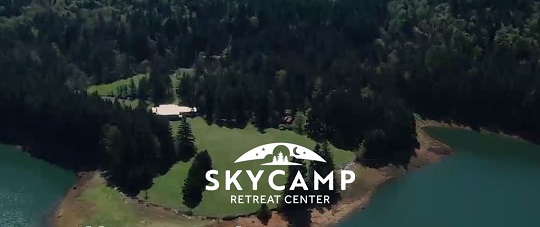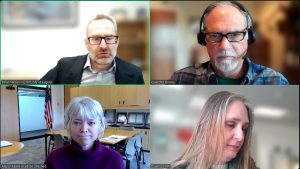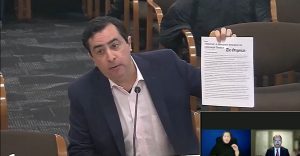New Era Convergence Aug. 21-24 to explore solidarity, unity in social movements
6 min read
Jason Schreiner: The New Era Convergence is really a launchpad. It’s a catalyst to bring together discussions and work and action that is already happening, and to just see how we can collaborate and mobilize more together, moving forward in a collaborative and focused way. So this is just going to be the first piece of a much larger initiative and movement that we intend to bring together.
[00:00:25] John Q: Offering a preview of the upcoming New Era Convergence, Jason Schreiner.
[00:00:29] Jason Schreiner: The format that we have is that all the participants will be participating together, in the major sessions. We have some times where different groups will be able to offer workshops, and then we have a time for open space, where people can self-organize at the event discussions or things they want to engage and that’s going to offer some choice for folks, but the main program is going to bring everyone together in very interactive participatory sessions to really generate ideas, as well as to begin thinking through some of the challenges that we foresee.
[00:01:04] So for instance, I’ll be facilitating a program, ‘How do we build solidarity and unity in a social movement?’ So a lot of it’s that kind of work, working through key questions and issues together.
[00:01:15] So some folks are using the ballot measure. Should we be putting all our effort into ballot initiatives? Should we be focusing on building human potential? Should we be looking to support political candidates? Should we be trying to build mutual aid societies in our communities? We’re seeing a wave of renewed labor organizing happening. I just saw workers standing outside of Starbucks today.
[00:01:39] Another example would be what are some of the shared, values and ideas that can bring people together? What kinds of interest can bring people together and what kind of lessons can we learn from the people out doing the work, both historically, but also people contemporarily. So we want to hear from some of those folks.
[00:01:56] What do we need to begin preparing now both in terms of building a movement, but also just in our community to weather some of those difficult situations that are already emerging and will continue to deepen in terms of their difficulty for us.
[00:02:11] We want to think about the immediacy of some of the big challenges that we are facing. Some of the hard times that folks are experiencing around, say, meeting basic needs. And then what happens if the systems that many of us rely on which we know are very fragile. You know, it doesn’t take much of a shock to send the system into a really much larger tailspin than we’re already experiencing. So what do we need to do, to be prepared for that?
[00:02:39] And the beauty of that is, is that it’s not just like we’re doomsday preppers, that’s not the emphasis. It’s really about what are the changes we want to see in our community to make it a better place, and what can we start working on now? And in the process, that’s going to prepare us for even more difficult times.
[00:02:58] Clare Strawn: We realize that this is a launching point. It’s not, a finishing point. And one of the things I’m hoping will come out of this is a realization that those plans, those immediate need plans. We need to keep in mind the long view, where are we headed? is the response to the disaster or to the housing crisis a Band-Aid on the current system, or is it a step towards a new system and a new model for where we want to go and what we want to make? So to me, that’s one of the cutting edge questions that I hope people will take with them from the meeting.
[00:03:33] Jason Schreiner: So that of course lends itself to really hone in and think about, well, what is our shared vision? What are some of the values that are going to hold communities together as they work for particular kinds of change. So we want to think through what that vision looks like, what those values are and when I read the literature on movements and hear the experiences of people, I think a lot of folks have quite similar and common ideas. We might use different terms. We might have a little bit different emphasis from our particular perspective, but there are certain kind of minimum things that we hold in common. We want to make those explicit at the convergence.
[00:04:10] How do we build unity and solidarity? What are some of those challenges, how do we reach out to diverse others? How do we bridge some of the social divides that we face, whether those are perceived or actual in our communities, how do we build infrastructures of support to help, diverse, groups and fronts of action have more coordination and work together?
[00:04:32] And then from there, what are our next steps? And so the program’s going to end on that note: What are the next things we need to do?
[00:04:39] And punctuated throughout that, of course, are going to be things like, there’s going to be opportunity to move your body. There’s going to be opportunity to enjoy great music, eat quality food, get outdoor time, socialize and network with others, and learn from some of the people coming to do some of the workshops.
[00:04:56] And of course we have a number of supplementary, complimentary supportive pieces that help glue that together.
[00:05:03] Clare Strawn: We have workshops on ‘Climate justice in song and art’. One on land use policy, ‘When the 70s-era anti-sprawl measures collide with the 2020s permaculture ethos,’ mostly about rural land policy in Oregon.
[00:05:19] Climate Action Hub—Find climate action in your community. This is a networking tool online for the climate movement, an orientation to that. And that might be the kind of tool that we want to develop coming out of this. How to achieve sustainable systems change, models for looking at systems change. Economic democracy as a replacement for capitalism.
[00:05:39] And then we’re going to have an open space. An open space is when people come to an event and they create the content of the event in the spot. So if there are issues that people feel are critical to the discussion that aren’t coming up, they can put it on a list on the wall, or if they want to go deeper into something, then we’ll have a time where people can cluster around those different topics and have more discussion on them.
[00:06:04] Jason Schreiner: We’re looking at something that’s not talking heads (No PowerPoints!) and not PowerPoints, but folks engaged in real conversations about important issues.
[00:06:14] Clare Strawn: Yeah. But it’s still a big agenda! And so we’re hoping that people will come ready to really have deep conversations. We put out a brief reading list. When people register, they get a link to that of, a couple videos and a couple short papers, because we want really people to really dig in and have a thoughtful frame for the discussions.
[00:06:36] And then we’re going to have five-minute talks, mini talks, for people to we have ’Creating preferred future with permaculture,’ another one, ‘Creating a better world,’ looking at personal practices. One on ‘The third wave and beyond,’ about the emergent movement, one on ‘Asset mapping’ and whoever comes and they want to sign up to give a five-minute talk on the thing they’re passionate about related to the convergence, then they can have a slot for that too.
[00:07:05] Then we’re also going to have yoga. We’re going to have ecstatic dance with Mike Meyer. We’re going to have ‘Songs for a better world’ concert. We’re going to have a brief ceremony. And there’s swimming!
[00:07:18] Jason Schreiner: Yeah, I just encourage everyone, if you can make it, to consider registering and join us.
[00:07:23] Clare Strawn: At New-Era-Convergence.org.
[00:07:28] John Q: Constructive transformation in person at Sky Camp Aug. 21-24.






